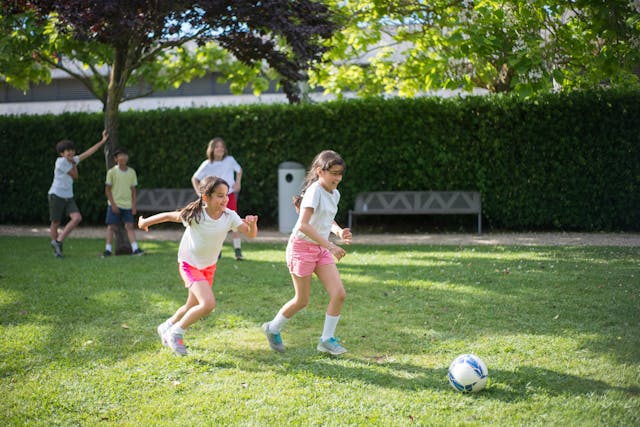Is your child’s educator displaying signs of an emotionally abusive teacher? These signs can have a detrimental impact on your child’s health and mental growth.
It’s time to shed light on the alarming signs of an emotionally abusive teacher, uncovering the truth behind their harmful actions.
Picture a lively classroom filled with curious young minds, all eager to soak up knowledge. Here, our precious children set off on a path towards a bright and promising future.
But there’s something we must be mindful of – the possibility of an emotionally abusive teacher. As caring parents, we trust these teachers to nurture our children with love and support. Still, it’s essential to acknowledge that, occasionally, some teachers may struggle to meet those expectations.
In this guide, we focus on the critical topic of identifying abusive teachers’ signs. It’s a must-read for parents and preschool teachers, aiming to ensure our young ones’ safety and well-being. Let’s learn to detect the warning signs and strive to make our classrooms a secure learning environment.
Unmasking the Emotional Impact of Classroom Abuse on Your Child

We’re all in agreement: teachers are the guiding force that moulds our children’s minds, nudging them onto a road paved with success.
But, ponder this: What if, instead of igniting a flame of inspiration, some inadvertently sow seeds of emotional distress that can haunt our children for a lifetime? It’s a sobering reality – a teacher’s emotional abuse can stunt a child’s growth and leave indelible marks on their mental wellness.
Picture your darling – once filled with limitless curiosity and enthusiasm – dreading the schooldays that used to fill them with delight, their luminous spirit dimming. The energy of young kids can dip when they face constant put-downs, too much criticism, and high demands from their teacher. This tough situation can shake their self-confidence – they may start doubting their skills, questioning their value, and sadly, they might even think they’re to blame for the mean behavior of their teacher.
A classroom bathed in such toxic vibes can sow the despairing seeds of anxiety, depression, and a crippling feeling of inadequacy in our child’s tender psyche. It’s up to us – as parents and educators – to recognize the emotional tsunami and quickly step in to shield our young ones from the potentially shattering aftermath of emotional abuse in the classroom.
9 Alarming Signs of Emotionally Abusive Teachers
Ready to crack open the secret code to spot an emotionally abusive teacher? It can be a tricky task, as the signs are often subtle and easily missed. We will walk you through nine red flags, offering you vital insights into this damaging classroom behavior and equipping you to safeguard our most innocent and precious gifts- our children.
1. Spot the Chameleon: Emotional Abuse Under a Clever Disguise
Let’s talk about those tricky teachers who dominate our kids’ classrooms. These sneaky folks act like puppet masters, pulling strings to manipulate innocent minds. They use hurtful words and put kids down to boost their egos. Classrooms become tense battlegrounds, where they misuse their authority to emotionally harm students. It’s time to expose them and protect our kids from their harmful ways.
2. The Classroom’s Simon Cowell: A Breeding Ground for Excessive Criticism and Overblown Expectations
We’ve all encountered that strict teacher who sees themselves as a Simon Cowell among young talents. These experts in criticism enjoy dishing out negative feedback, damaging a child’s self-esteem. They set impossibly high standards, pushing kids beyond their limits as if they were training for the Olympics instead of being students. Their approach fosters feelings of inadequacy and low confidence, but we must identify these critique masters before their harmful influence sticks to our kids like unwanted gum.
3. The Party Crasher: The Alienation of Children from Their Peers
The party’s silent spoilsport, aka the isolating teacher, purposely slices the cord between children and their peers like a knife through warm butter. They morph the classroom into a breeding ground of loneliness, a place of emotional detachment. These teachers prey on unsuspecting victims, particularly those already wrestling with insecurities. We can’t let these party-poopers tarnish our kids’ emotional health and vibrant social lives.
4. Buckle Up for The Emotional Whirlwind: Unpredictable Mood Swings and Explosive Behavior
Get ready for a wild ride with these emotionally unstable teachers. One moment they’re as sweet as candy, the next, they morph into fire-breathing monsters. Their unpredictable mood changes can bewilder our precious ones, creating a classroom atmosphere as turbulent as a rickety roller coaster ride. We must stay vigilant of these erratic behaviors and shield our kids from this emotionally jarring experience.
5. Boundary Bandits: Invasion of Personal Space and Privacy
We’re dealing with invasive pythons here, folks – teachers who pay no heed to personal space or privacy. They trample over personal boundaries as if playing a rough game of tag and invade personal spaces enough to send chills down our spines. Breaching a child’s sense of security becomes second nature to them. It’s time we stood as a human shield and put an end to these invasive privacy crushers.
6. The Sound of Silence: Emotional Support and Encouragement Deserted
Here, we have a teacher who treats emotional support as if it’s an extinct species. These Silent Susans offer zero empathy or encouragement, sometimes it feels like they’ve developed a fatal allergy to sensitivity. Let’s unwrap this indifference and ensure our kids are wrapped in a warm blanket of emotional support.
7. The Puppet Master: Pulls the Strings and Paints a Rosy Picture
As a caring preschool teacher, I want to warn you about the puppeteer in the room. They excel at controlling the parent-teacher conversations, expertly twisting facts and portraying themselves as saints. It’s crucial to see through their act and break free from their manipulative strings to have an honest and clear understanding. Let’s work together to ensure transparency and open communication!
8. The Joy Extinguisher: Buries Creativity and Curiosity Six Feet Under
Step into the world of these joy extinguishers, where they dampen our children’s curiosity and sense of exploration, hindering their creative growth. Their goal? To stifle the dynamic minds of children. But fear not! We must reignite the flame of creativity and curiosity, setting our children free to explore and thrive. Let’s bring back the sparkle in their eyes!
9. Trust Crushers: Parent-Teacher Relationship on the Rocks
Get ready for the trust-breakers. These teachers build walls between parents, blocking healthy communication. We must break down these walls and build a bridge of understanding, respect, and trust.
Friends, it’s our duty to protect our children from emotional abuse in classrooms. By staying alert to the signs, we can create a safe place for our little ones to thrive. Let’s stand together and confront abusive teachers head-on.
Wave after Wave: Uncovering the Far-Reaching Impact of Emotional Abuse on Children
Prepare to dive into the far-reaching impact of emotional abuse on young hearts. Believe it or not, its effects can be as overwhelming as a powerful wave, lasting for a long time.
Emotional abuse is like a wrecking ball that hurts our kids’ self-esteem and confidence. It makes them doubt themselves and feel less worthy. It even affects their learning, stopping them from reaching their full potential.
The sad part is that these wounds can stay with them into adulthood, affecting their relationships and happiness. What they need is early help and support to heal and grow strong again.
Want to know about signs of bad preschool teacher, read our blog post here!
Time to Charge Forward: Parents and Teachers Unite Against the Menace of Emotional Abuse
Listen up, parents and teachers, it’s time for us to band together and wage war against emotional abuse in our classrooms. We can’t stand on the sidelines while our children bear the brunt. Opening clear channels of communication with our kids is the first line of defense.
It takes a community effort to protect our children. Trust, understanding, and a shared commitment will make our classrooms a haven for them. If you sense any red flags of emotional abuse, seek expert advice or report your concerns. Preschool teachers play a crucial role in creating a nurturing environment. Let’s equip them with care, awareness, and prevention tools to ensure our children’s well-being.
And if your gut raises red flags about emotional abuse, don’t hesitate to seek expert advice or report your apprehensions to the authorities. Preschool teachers are the gatekeepers of a supportive learning environment. Let’s equip them with care, awareness, and active prevention mechanisms against emotional abuse.
Building Robust Spirits: Nurturing Emotional Well-being to Elevate Education

Shifting our focus, let’s turn to the cornerstone of our children’s growth—promoting emotional wellness. Our ambition is to nurture our kids into emotionally resilient, academically accomplished individuals. The building blocks?
Empathy, compassion, and emotional awareness.
Let’s instil these in our classrooms, teaching children to understand, respect, and appreciate feelings. A classroom animated by empathy and understanding is a beacon of harmony and support. Fostering robust parent-teacher-child relationships functions like a potent glue, binding us in our collective endeavour to provide our children with the support, love, and guidance they need to bloom.
We need to champion a school culture that regards emotional well-being and mental health as priorities on par with academic success. It’s time we placed emotional wellness on the high pedestal it deserves. What’s more, we must salute the positive change brought about by compassionate, inspiring teaching. As our children bask in the warmth of supportive teachers, they grow resilient, surmount obstacles, and reach out to grasp the stars.









